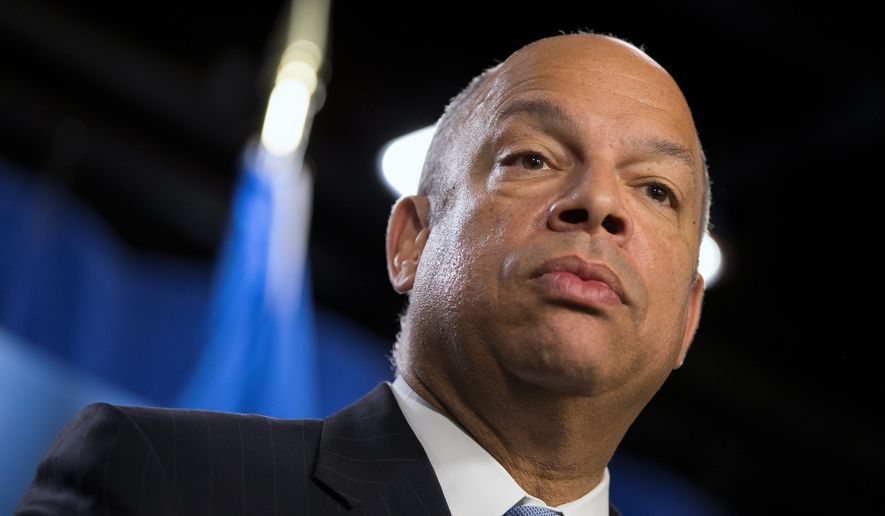Former Homeland Security Secretary Jeh Johnson has dug through more than 26,000 emails from his personal account, trying to figure out which of those were government business that he should have turned over to the government as official records, the Justice Department told a federal court Monday.
Three of Mr. Johnson’s top aides also used personal accounts to do their official work, the government has told the court — feeding the growing legal storm over secret email accounts and how much access the public should have to those records.
Judicial Watch has sued to get a look at the messages from Mr. Johnson and his staffers.
Meanwhile, 13 state branches of the American Civil Liberties Union filed open-records requests last month seeking personal emails of U.S. Border Patrol officials and agents. They think they will find evidence of how President Trump’s policies are being carried out.
In Michigan, Progress Michigan, a liberal advocacy group, filed a state FOIA lawsuit in April against Michigan Attorney General Bill Schuette, seeking his personal emails as well as that of his staff.
In Vermont, a number of open-records cases are seeking various records believed to be in a private email account belonging to former state Attorney General William Sorrell, and one of those cases will be decided by the state’s highest court.
Brady Toensing, a lawyer in Vermont, is taking Mr. Sorrell’s case to the Vermont Supreme Court after a trial court ruled that the personal emails weren’t subject to search or disclosure.
“If the law can be avoided by setting up a Hotmail account, then we should just scrap the law entirely and do away with the pretense of an open government,” said Mr. Toensing.
The seekers, particularly at the federal level, have been bolstered by an appeals court ruling in Washington last year that held a government employee’s personal email account could in fact be reached by Freedom of Information Act requests if that account had been used for conducting government business.
In that case, President Obama’s top science adviser, John Holdren, director of the Office of Science and Technology Policy, had worked on global warming documents on his personal account at the Woods Hole Research Center. The Competitive Enterprise Institute tried to get a look at the documents, but Mr. Holdren and the Obama administration resisted.
Eventually, a federal court demanded that Mr. Holdren preserve his account to make sure the court could access his emails.
Since the ruling in July, the Competitive Enterprise Institute case been cited in six other lawsuits.
Email was widely used during the Bush administration, but the volume exploded during the Obama administration, where the president’s top officials pushed the boundaries of what was acceptable.
The most prominent example was Secretary of State Hillary Clinton, who used a secret email account to shield her messages from public disclosure for years. Her arrangement — which included a server she kept at her home, risking top national security secrets — was disclosed only during a congressional investigation into the Benghazi terrorist attack.
Open-records laws dissuade officials from conducting business on personal accounts. If it happens, the officials are to make sure copies of the documents appear in official agency records so they can be preserved, searched and released in response to proper requests.
It wasn’t just Mrs. Clinton who struggled with those rules.
Top officials at the Environmental Protection Agency were cited for using personal emails to circumvent public scrutiny, former Defense Secretary Ashton Carter admitted to using a personal account for government business, and Mr. Johnson and his aides also acknowledged their transgressions.
“It’s becoming a bigger and bigger issue. It used to be all paper records, and now people are getting smart about it — looking for more email records, online database records, information on the cloud,” said Andy Wilson, CEO of Logikcull, a legal intelligence data discovery source.
Congress has updated open-records laws to try to prevent a repeat of Mrs. Clinton’s situation.
Sam Kazman, general counsel at the Competitive Enterprise Institute, said the use of personal email for government business has been an issue. After the federal court’s ruling last summer, an increasing number of agencies are conducting searches of personal email accounts without having to be pushed to do them.
“It was viewed as somewhat precedent-setting in not only how people make FOIA requests, but also in how agencies respond to them,” said Mr. Kazman. “Under the Obama administration, the use of these somewhat new technologies to avoid FOIA became much more widespread.”
The issue is trickling down to the states, where the growing reach of federal laws is prompting a re-examination.
Two months after the CEI ruling, Illinois Attorney General Lisa Madigan wrote an opinion citing the case in saying Chicago police couldn’t withhold personal emails pertaining to the shooting of a black youth by a white police officer. In September, the city appealed the opinion.
The California Supreme Court ruled this year that the state’s Public Record Act includes disclosure for personal emails of government employees when the records contain official business, citing the federal appeals court’s ruling.
• Alex Swoyer can be reached at aswoyer@washingtontimes.com.




Please read our comment policy before commenting.